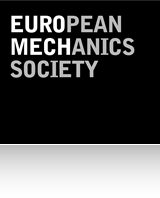
Main topics of the Colloquium:
- Multiscale and multiphysical computational models for bone remodeling
- Interactions between bone damage and remodeling.
- Topology and shape optimization approaches for functional adaptation.
- Models based on high resolution imaging techniques.
- Phenomena at the interface between bone implants and biosubstitutes.
- Cellular aspects: mechano-transduction of bone remodeling.
- Measurement of bone properties at different scales.
- Osteoporosis: prediction, advanced imaging techniques, fracture repair.
- Development of patient-specific predictive models and treatments.
The objective of the Colloquium is to bring together researchers amongst the computational and experimental mechanics and biomechanics community to exchange the latest achievements as well as recent research work in the field of bone mechanical research. The Colloquium shall provide state-of-the-art information in the domain of bone mechanics, focusing on bone remodeling and bone adaptation as a core topic.
A bone has the ability to adapt its external shape and internal structure to variations in its mechanical environment. The adaptive response of bones to changes in load history is called bone remodeling since the pioneering work of Wolff (1892): adaptation of bone to functional demands such as mechanical loadings may result in bone loss in situations of reduced loading, and bone mass increase in situations when functional mechanical loadings exceed a certain magnitude.
Despite the many studies devoted to the mechanisms controlling the process of bone formation and renewal, a clear understanding of the underlying mechanisms across the scales and the role of mechanical loading is still not available. Bone is multiscale in nature and the tissue integrity is maintained across large length and time scales by complex multiscale multiphysical homeostatic processes regulated by specialized cells. Since these are difficult to identify based purely on experiments, it is important to develop multiscale computational approaches in combination with the acquisition of new experimental data obtained by efficient imaging techniques to integrate and investigate these processes.
Optimization theories envisage bone as a mechanical structure undergoing an evolutionary adaptation, and will be one important topic of the Colloquium.
Application of the computational models to predict the impact of medical treatments and implants in a patient-specific based approach is another important topic covered by the Colloquium.
The Colloquium shall provide state-of-the-art information in the domain of bone mechanics, focusing on bone remodeling and adaptation as a core topic.
Abstract submission: Abstracts can be submitted online or by email to either organizers up to February 15, 2018.
Notification of acceptance will be given on March 01, 2018.
Extended Abstracts of the Colloquium will be published as a special issue of Journal of Engineering in Medicine (http://journals.sagepub.com/home/pih).
|
Committees International advisory committee R. Hambli, Orléans, France D. Pioletti, EPFL, Suisse T. Lemaire, MSME, Paris, France D. Mitton, IFSTTAR, Lyon, France Local organizing committee Adrien Baldit, Anne-Sophie Bonnet, Emilie de Brosse, Jean-François Ganghoffer, Cédric Laurent, Paul Lipinski, Rachid Rahouadj
How to register To participate in the EUROMECH Colloquium 594, all participants are required to pay the registration fee. Early Registration fee (for those participants who sign up no later than February 15, 2018): 300 euros for supporters not members of EUROMECH. 350 euros for supporters not members of EUROMECH. Registration fees will cover coffee and snacks, the banquet and visits to local sites.
|
